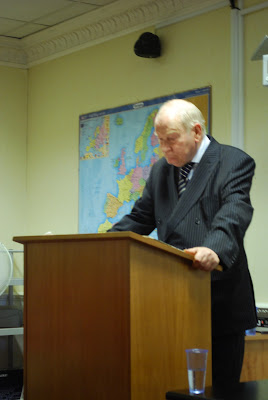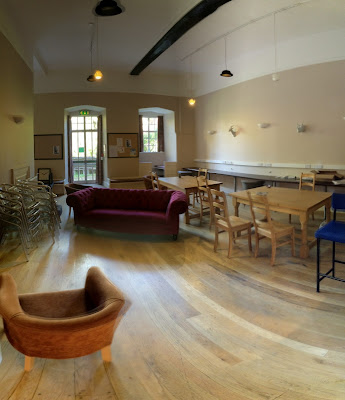Weather: sunny, mid-70s
We began our orientation with an "Introduction to the Oxford Academic System." Fairly dry material one would imagine. Using the library, college overviews, and the like. However, we at OSAP/WISC have the good fortune to receive our introduction to Oxford from the uproariously funny Professor Robert Schüttinger, the Director or OSAP as well as a former Visiting Fellow in International Relations, MC, Oxford University and an Associate Fellow at Davenport College, Yale. He also has spent time at the U.S. Department of State.
 |
| Professor Robert Schüttinger |
As we soon learned, Prof. Schüttinger is quite a character. Though American, he talks like Churchhill and dresses like a naval man with double-breasted suits and a stripped tie reminiscent of a pea-coat or sailor´s suit (he did, in fact, serve in the U.S. Navy). His catchphrases include "that´s a killer fact" (fact or statistic that changes the world) and "...as you say" (this after every second or third sentence). We thoroughly enjoyed his introduction and will be very fortunate to hear several more lectures from him over the next few days.
He began by showing off the WISC office's prized collection of 19th
century
Vanity Fair covers (an entirely different magazine from the one we know today), most depicting caricatures of leading
statesmen of the day. Prof. Schüttinger spouted off remarks about
nearly every one. (e.g. "You can tell he´s the [Ottoman] sultan from all
his 'marijuana tubes' (hookas).")
He then attempted to briefly explain the University of Oxford system. The university is comprised of
about 44 self-administrating colleges (some departments are technically colleges). There are also
about 100 university-affiliated libraries in town: including individual college libraries, the Bodleian library, and several specialized collections. Most academic life takes place within the colleges. Students live, dine, and study within their college campuses. Professors belong to independent faculties of their subjects (e.g. Faculty of English, History, etc.) and typically tutor or hold fellowships within a particular college. One could say that the university is therefore a loose federation of colleges and faculties more than a single, unified body. The university does have an overall governing body, but in practice the individual colleges are very powerful.
The primary method of education is the tutorial. Students meet with their tutors (professors, though often called 'dons') approximately once a week, spend the next week reading reference material at the various libraries, write a 2,000-2,500 word essay on a given theme, and meet with the tutor the following week to review the essay. Wash. Rinse. Repeat. Students take about two tutorials per eight-week term. There are three terms: Michaelmas (fall), Hillary (spring), and Trinity (spring-summer). This seems rather simple at first glance, but students supplement their
tutorials with optional public lectures provided by the various
colleges. The idea is to learn to learn to educate oneself, to craft a
convincing argument based on one's knowledge, and to defend it well. Students sit for cumulative examinations during their first or second year and in their final year, earning first-, upper or lower second-, or third-class honours based on the results. First-class honours in both sets of exams is a Double-First, etc. First-class honours is the typical requirement for post-graduate work. Post-graduate work is not as common in the UK, and many famous academics including J.R.R. Tolkien and C.S. Lewis never held anything higher than a B.A. After seven years an Oxford graduate can actually write in to receive his or her M.A. for a small fee (I've heard £5). "You're an Oxford grad. You're probably doing pretty well for yourself anyway."
The University does have something of an unwanted reputation as a playground for the British upper classes. There was a time when "Gentlemanly Cs" (third-class honors??) were fashionable in some circles. Prof. Schüttinger told the story in which, several years ago, Christ Church came in fourth among colleges for academic achievement and several C.C. graduates in the audience booed the announcement. Not because of a poor showing, but rather from the perception that the college was "trying too hard". There is something to be said for balancing work with play. Oxford has numerous clubs and teams and an education doesn't come strictly from books.
Lest I give the impression that Oxford is a elitist upper-class institution,well... It is, but it is also international. 1/3 of the university is foreign: students and faculty. The world's best and brightest come here to learn and for a few weeks, and we have the extraordinary opportunity to mix with them and become a little richer for the experience. To find ourselves. (Prof. Schüttinger's Killer Fact: "Personally, I've never lost myself, so there has been no need in looking.)
Later in the day we met the Head of the New College Library who explained the rather complex and confusing Bodleian library system. "The Bod" is predominately a reading library; materials are not allowed out of the building. However, several of the colleges are lending libraries and certain materials can be shipped to your college library for easier access. As the library system currently contains about 11 million volumes, many obscure and less-used materials are housed in a storage facility 20 miles away. Students must plan their research schedules carefully as books may take a day or two to reach their destination. New College has a great German collection, but as a member of Christ Church, I have no access to the New College collection. I must ask a New College member to collect materials for me, or else make friends with, say, the Head Librarian. I 've already made some headway on the latter track.
In the afternoon, another professor discussed tutorial essays in greater detail before the WISC students made our way over to the Bodleian library to take our library oaths. After the loss of a large portion of the collection during the religious turmoil of the Reformation in the 1500s, the library was reconstituted with strict laws including an article requiring all members to swear an oath to abstain from defacing materials or bringing "open flames" into the library, a necessary precaution before the invention of electric lighting. And still a good idea today. We took our oaths in the chapel of the old Divinity School and received library cards which will also act as our primary student cards during our time at Oxford.
 |
| The Divinity School, Bodleian Library, Oxford |
 |
| Taking the Bodleian oath in the chapel of the Divinity School, Oxford |
During all of this, I was supposed to meet my German Film tutor in her rooms at New College, but due to the fact that the group was literally locked inside the chapel until we had sworn our oaths, I missed my appointment. Terribly disappointed , but I rescheduled my tutorial for next week. Since I was there, I did manage to explore New College a bit, particularly the college chapel with its exquisite altar.
 |
| New College chapel, Oxford |
Afterwards, dinner, a walk, and preparations for another round of orientation lectures, "as you say."



























